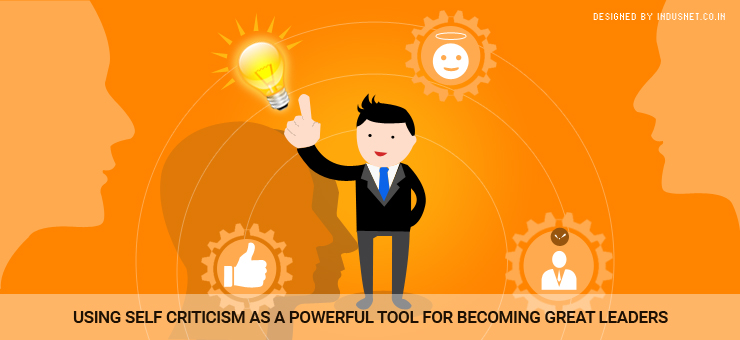
Self-criticism can be a very powerful enemy. A lot of us demean ourselves and we end up procrastinating, underestimating ourselves and even feeling demotivated, because of the harsh inner critic. The harsh inner critic is usually the result of an overactive super ego, according to Freudian theories.
Freud believed that human personality is controlled by animal and dark instincts, controlled by Id, while our Ego tries to strike a neutral balance between these libidinal forces and the morally cautionary Super Ego. If Super Ego is really strong, it can interfere with our thinking and behavior, constantly criticizing us and make us believe that we are probably wrong all the time. The Ego (or our consciousness mind) has to deal with inner dark forces and a moralistic mind that tells us to control ourselves.
Entrepreneurship and the harsh inner critic
Entrepreneurs frequently have this inner harsh critic, which tells them that their decisions are poor, they are taking far too many risks, they may not be as competent as they believe they are and the worst of them all, that they don’t deserve success. Yet, this inner critic need not be always negative. Super Ego is known to be very helpful too, helping us to make the right decisions and choices, without succumbing to baser desires.
For instance, if you feel like you need to purchase a company just because it looks attractive, your Id forces are taking over. Your Super Ego might warn and tell you not to do so. An inner conversation would be something like:
“I want to buy XYZ startup right away. Okay, wait a minute. It may not be such a good idea. This company can cause more losses than profits and I always tend to be impulsive in making decisions”.
In this case, the Super Ego clearly is helping the individual to not make a foolish startup acquisition. This will save the CEO a lot of money and probably will also earn him respect. This sort of criticism (telling oneself that some decisions may be impulsive, for example) need not be bad at all. In fact, such self-criticism arising from a charged up Super Ego should always be welcomed.
Learning to be a better leader using self-criticism
Psychological studies point out that self-criticism can help people to be better leaders. The inner critic can warn, reproach, advice and even help you to introspect, allowing you to grow as a person and as a leader. Sometimes, all you need to do in order to be a better leader is to just listen to that inner critical voice. In this article, let us take a look at how self-criticism can help you become a better leader.
1. Make better decisions
One of the biggest gifts of a harsh inner critic is, it helps us to make better decisions. Whether it is a hiring decision or avoiding impulsiveness, a harsh inner critic can be a valuable tool. If you want to be a better leader, you will need to take a number of difficult decisions, some of which you may personally not like. Your inner critic will help you to make decisions that you may personally not like. After all, the most important characteristic of a good leader is his or her ability to make great decisions in spite of difficult choices.
2. Practice restraint
Another important leadership skill is to practice restraint. Even when your gut feeling tells you to do something, you will need to say no to yourself. You will need to criticize yourself for being hasty and taking actions which may not be very wise. Practicing restraint turns out to be one of the most important qualities of a leader. If you wish to be a great leader, you should be able to say ‘no’ to yourself and to what your heart desires. Saying no to yourself helps you to become a strong-willed person, which in turn helps you to become a better leader.
3. Make peace with others
A leader cannot and should not have enemies. He or she should never hold grudges or petty disagreements. A good leader is someone who is able to forgive and make peace with adversaries. This builds character and also helps in being a role model to followers. If you wish to be a leader, you will need to make peace with others even when you feel like disagreeing with them. You can go ahead and disagree, but you can do so in a way that is not offensive. One who is able to make peace with those he disagrees is the one who can be a leader. This requires a lot of maturity and ability to listen to the inner critic.
4. Follow a routine
Most importantly, a leader should be able to follow discipline and not be controlled by Id impulses. Id impulses can manifest in the form of not being disciplined, being lazy, procrastinating and even acting impulsively. For all this, you need to critically evaluate your actions and thoughts and finally, bring in some discipline. This discipline can set in only when you listen to your inner critic. Discipline also helps you to follow a routine, which is required to set an example and be a great leader. After all, every great man in this world always followed healthy routines.
Listen to your inner critic but do not become despondent
While your inner critic can be a great teacher, it can also bring you down and make you despondent. You should not allow that to happen. Healthy self-criticism can help you to become a disciplined and strong-willed person. However, too much of self-criticism will lead to despondency and dejection. If you wish to be a better leader, learn to control both your Id impulses and your harsh inner critic. Strike a balance between the two and engage in healthy self-criticism. This will help you to grow as both an individual and a leader.